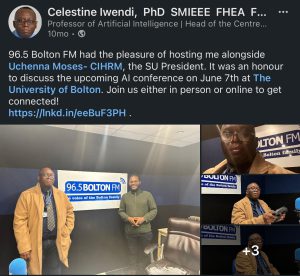 Technology is transforming our world faster than traditional classrooms can keep pace. For students across Africa, the UK, and beyond, the digital divide isn’t just a buzzword—it’s a barrier. And that’s exactly what fuels my mission.
Technology is transforming our world faster than traditional classrooms can keep pace. For students across Africa, the UK, and beyond, the digital divide isn’t just a buzzword—it’s a barrier. And that’s exactly what fuels my mission.
While serving as President of the Students’ Union at the University of Bolton in 2024, I co-organised the landmark Next Generation Artificial Intelligence Conference in June. Supported by the University of Bolton (University of Greater Manchester) and co-led with Professor Celestine Iwendi and Sam Johnson, the event brought together global voices from academia, industry, and policy.
It was at this conference that we officially launched the Centre of Intelligence of Things (CIOTH)—a bold initiative led by Prof. Iwendi, focused on transforming academic research into real-world impact. The Centre represents a powerful vision: that universities must not only keep up with the tech revolution but lead it—bridging the global AI literacy gap. 
Today, I work as a Digital Project Manager with the UK’s Medicines and Healthcare products Regulatory Agency (MHRA), where I help build and manage the digital infrastructure that powers essential public services. Yet, my mission remains the same: to make digital transformation inclusive, accessible, and ethical. If anything, that mission has only grown clearer.
At the AI Conference, I said something that still echoes strongly:
“It is not enough for universities to ban the use of AI. What we need is to teach when, why, and how to use it responsibly. Higher education is still the most trusted place to shape both knowledge and character—we cannot leave ethical tech education to chance.”
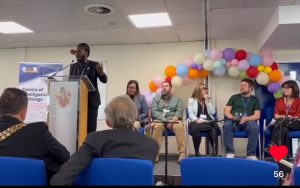 That belief is personal. I’ve seen how many students—especially international and under-resourced learners—struggle to access digital tools. While bootcamps and platforms may be widely available, affordability and accessibility remain major hurdles. This is why I believe universities are best positioned to lead the charge in delivering ethical and inclusive AI education.
That belief is personal. I’ve seen how many students—especially international and under-resourced learners—struggle to access digital tools. While bootcamps and platforms may be widely available, affordability and accessibility remain major hurdles. This is why I believe universities are best positioned to lead the charge in delivering ethical and inclusive AI education.
That message gained further reach when I joined Prof. Iwendi on Bolton Radio, where we discussed how AI can help dismantle language barriers—especially for students whose first language isn’t English. We explored how AI-driven language models can empower learners to absorb content at their own pace, whether they’re studying in Bolton or Lagos. For many students, it’s not just about keeping up—it’s about not being left behind.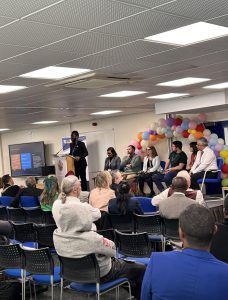
International frameworks support this vision. The UNESCO Recommendation on the Ethics of Artificial Intelligence calls for AI systems to “contribute to equitable outcomes” and not widen digital divides. Similarly, the World Bank’s Digital Economy for Africa (DE4A) initiative highlights the urgent need to invest in inclusive digital skills across the continent.
These global goals reflect a local truth: young people in Nigeria and across the Global South are eager to learn, build, and lead. What they need are platforms that meet them where they are.
This is why I’m committed to embedding AI and digital literacy not just as technical skills—but as civic skills.
Yes, the challenges are real—from limited access to 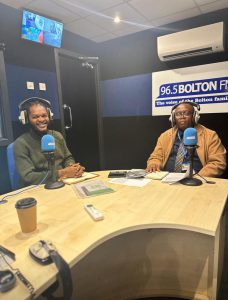 devices, to inadequate infrastructure and unequal opportunities. But so are the possibilities. We have the tools, the talent, and the tenacity. What we need now is coordination, courage, and a shared commitment to inclusion.
devices, to inadequate infrastructure and unequal opportunities. But so are the possibilities. We have the tools, the talent, and the tenacity. What we need now is coordination, courage, and a shared commitment to inclusion.
As I continue to work across public service and educational sectors, I remain dedicated to building systems that are human-centred, values-led, and future-ready. Whether it’s through policy, platforms, or people—we all have a role to play.
Because as I’ve come to realise:
You don’t have to be from Silicon Valley to shape the future.
Sometimes, all it takes is a microphone, a message, and a movement that believes in people.
References
🔗 UNESCO (2021). Ethics of Artificial Intelligence – Recommendation. Link
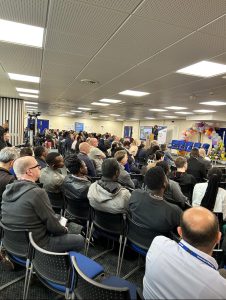 🔗 World Bank. Digital Economy for Africa (DE4A). Link
🔗 World Bank. Digital Economy for Africa (DE4A). Link
🔗 Centre of Intelligence of Things (CIOTH), University of Bolton. Event Archive